Ukrainian-Japanese Interpreter Vitalii Zhygalko: Using the Japanese Language for Business in Ukraine
*Interview by Robert Campbell, Scholar of Japanese Literature
2025.5.01
【Feature 082】
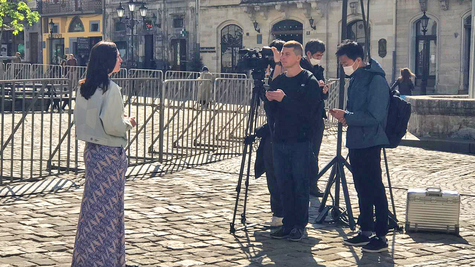
Image: Taken in May 2022 in Lviv during filming with a Japanese TV crew
Vitalii Zhygalko, a Kyiv-based Japanese interpreter and coordinator, has dedicated his professional life to fostering connections between Ukraine and Japan. After studying Japanese at Kyiv National Linguistic University, he built a career coordinating coverage for Japanese media, assisting Japanese companies and public institutions, and providing interpretation services across Ukraine. However, the COVID-19 pandemic in 2020 threw his work into chaos, forcing his Kyiv-based company to operate remotely. An even greater upheaval, however, came in February 2022 with Russia's military invasion of Ukraine, which shattered normal life overnight. Zhygalko's team was scattered across borders, and he was forced to flee to western Ukraine. After a turbulent period in Makariv, he returned to Kyiv, where he continues to lead his team remotely, navigating new challenges while striving to keep his mission alive.
Joining us remotely from Ukraine, Zhygalko shares his insights in this exclusive interview. Leading the conversation is Robert Campbell--a renowned scholar of Japanese literature who has visited Ukraine himself. He also translated the dual-language (English-Ukrainian) book A Ukrainian Dictionary of War into Japanese with the title Senso Goishu (Iwanami Shoten). The original work in Ukrainian was by the Ukrainian poet Ostap Slyvynsky. With years of expertise working in the Japanese language, Campbell dives deep into Zhygalko's journey, exploring his experiences from every angle.

*The interview was conducted remotely in November 2024.
The Evolving Landscape of Remote Work Using the Japanese Language
Campbell: I can only imagine how tough it must be to handle everything remotely in the middle of a war. When I spent about two weeks in Ukraine in 2023, I held in-person workshops at a national university, and despite some concern about the strict restrictions on in-person gatherings, I was incredibly moved by the chance to connect with students face-to-face. Since meeting in person is still a challenge there, how are you managing your Japanese-language work, Vitalii?
Zhygalko: I continue working remotely with colleagues abroad, while I live in Kyiv with my family, actively doing interpretation and media-support work on the ground across Ukraine. When the Japanese media come to report on-site, I handle everything--from interpreting and frontline reporting to securing accommodations and mapping out the safest routes in conflict zones. Beyond that, I play a key role in projects for Japanese government agencies and international organizations like JICA (Japan International Cooperation Agency) and JICS (Japan International Cooperation System), managing the procurement and logistics of humanitarian aid, such as demining equipment, while serving as a crucial link between Japan and Ukraine.
How Russia's Invasion Transformed My Work and My Mission to Share the Truth in Japanese
Zhygalko, the cofounder of YUKARI, built his business around interpreting and guiding Japanese clients. But when war broke out, everything changed in an instant.
Campbell: We're fast approaching three years since Russia's invasion began. How has your work changed compared to before the war?
Zhygalko: Before Russia's invasion, life was relatively peaceful. Honestly, even during the 2014 annexation of Crimea, I didn't fully grasp the gravity of the situation or take things as seriously as I should have. As a business owner juggling multiple projects, I was focused solely on building and expanding my company. But on February 24, 2022, life completely changed.
I remember that day like it was yesterday. I was in Makariv, a town about forty kilometers west of Kyiv, near Bucha--one of the first places to come under attack. Suddenly, there was the shocking sound of bombs exploding. I was covering a story with journalists from a Japanese TV network that day, but as soon as the bombing started, I immediately urged them to evacuate. Not long after, Russian armored vehicles rolled in right before my eyes, turning Makariv into a frontline. My children's kindergarten was reduced to rubble, and my family had no choice but to flee to Uzhhorod in western Ukraine. Even then, I never stopped reporting--continuing to share frontline updates in Japanese for the media.
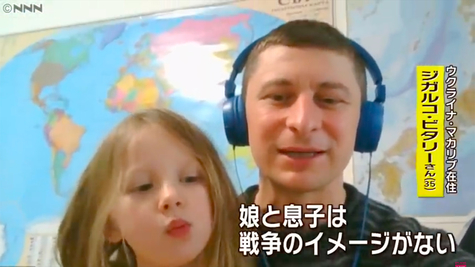
Image: From the February 27, 2022, broadcast of "Shinso Hodo Bankisha!" (Nippon TV)
Campbell: Normally, you would need only the Ukrainian language to cope with an emergency. But you were in the middle of a war zone--where things can change in a flash--and instead of ensuring your own safety, you continued to report what was happening in front of you--in Japanese. That could be incredibly difficult for someone who isn't a native Japanese speaker. With thirty minutes to spare, you might have been able to organize your thoughts and write a script, but you didn't have that much time. You had to deliver crucial updates in real time, in Japanese, without hesitation. What was going through your mind in those moments?
Zhygalko: When the war broke out, I was overwhelmed with fear and stress. Even in all the chaos, however, the Japanese media reached out, and I knew that my mission wasn't just to survive. It was to make sure the Japanese public heard the truth about Ukraine, in their language, straight from the source. With explosions echoing around me, I reported every single day--right up until March 1, when the attack on Makariv cut all power, severing communication. There was a moment when my connection with my Japanese business partners deepened in a way I had never expected. A TV network reached out to ask what they could do for me and my family. Around that time, Japanese chanson singer Kumiko, a longtime friend, gave a moving performance filled with prayers and well-wishes. In the midst of that dire situation, the kindness of the Japanese people truly changed me. Before the invasion, many of my ties to Japan were business-related, but after that, my admiration and love for Japanese culture and the people grew stronger than ever. I truly longed to collaborate more with Japanese people, and I realized more than ever that the Japanese language is my calling.
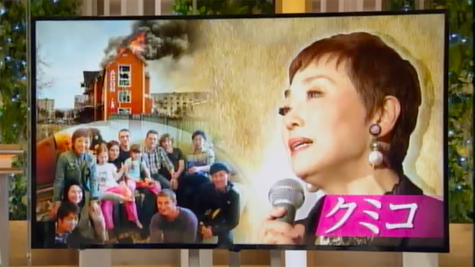
Image: From the March 29, 2022, broadcast of "International News Report 2022" (NHK)
The War Caused a Shortage of Japanese Speakers in Ukraine and Brought Serious Challenges to Talent Development
The war may have fueled Zhygalko's passion for his work, but it also created major challenges that remain unresolved. Most of his company's staff, along with nearly all Japanese-speaking interpreters, have fled the country, leading to a severe shortage of Japanese speakers in Ukraine.
Campbell: Before the war, you had a team that helped with your workload, but now you're handling almost everything yourself in Ukraine. With so few fluent Japanese speakers left there, how has this shortage impacted your work? How many people are still with your company, and how do you keep operating?
Zhygalko: Before the war, our team had around ten members--five interpreters (including me), plus an accountant, driver, and cameraman. However, when the invasion began, most of our staff fled to countries like Spain and Germany. Now, in all of Ukraine, there are only two of us who can interpret in Japanese. With such a severe staff shortage, large-scale projects are becoming incredibly difficult to manage--sometimes, we just can't keep up. When high-ranking Japanese government officials visit, top-tier interpreters are a must. I can interpret for one such person, but if there are two, a second interpreter of the same level is needed--and nearly impossible to find. In fact, we've had to turn down government projects simply because there weren't enough of us to do the job.
Campbell: This is a serious issue, yet it's rarely mentioned in the Japanese media. The shortage of fluent Japanese speakers must make your work incredibly difficult. When I visited Ukraine in 2023, I was struck by something unexpected--despite the war, national universities were still holding Japanese-language classes, and their enrollment hadn't dropped. Students were as passionate as ever, which was truly inspiring to see. But while the enthusiasm of students has remained strong, the number of Japanese-language instructors--especially those who are native speakers--has been shrinking. With almost no Japanese educators now heading to Ukraine, not only are Japanese speakers becoming scarce, but so are the Japanese mentors who are needed to train the next generation of Japanese teachers. That's a problem that can't be ignored.
Zhygalko: Developing Japanese-speaking talent is a big challenge right now. The struggle for my business isn't just finding interpreters but also ensuring their quality and reliability for the job at hand. Before the war, I could arrange for staff to receive hands-on training in the field to hone their real-world interpretation skills. Now, every new hire must be trained from the ground up without benefit of practical experience, which is time-consuming--and risky. Working in a war zone is dangerous. As a business owner, I have to ensure not just my team's language accuracy--but its safety too!
Campbell: Language isn't just about vocabulary and grammar--it's also about experience, cultural understanding, and the ability to navigate real-world situations. High-level interpretation, especially in business, requires far more than what can be taught in a classroom. With peace still a distant goal, how do you envision training the next generation of Japanese-speaking professionals in Ukraine?
Zhygalko: Above all is the safety of my staff and business partners. But once the situation allows, I will launch some big plans. Ukraine's language universities are full of passionate students eager to learn Japanese, and I want to support their dreams. I envision giving hands-on lectures, developing specialized training materials, and passing down my real-world experience in interpretation, journalism, and media communication. My goal is to help shape the next generation of professionals who can bridge cultures and share Ukraine's story with the world.
Campbell: That's an incredible idea. In your view, what would be the best way to tackle the challenge of training new talent?
Zhygalko: A long-term vision is key. In stable jobs lasting a year or more, we could train new talent and offer them real-world experience. I also see great potential in collaborating with universities on internship programs, in which we provide the hands-on experience for students.
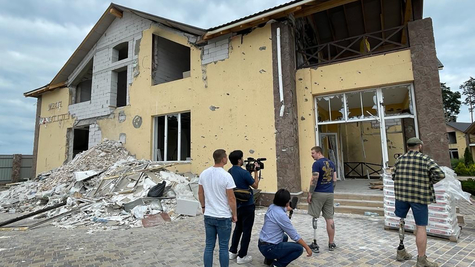
Image: Filming in Bucha with a Japanese TV crew, August 2022
My Calling: A Deep Passion for Japan That Fuels My Work
Despite the chaos of war, Zhygalko continues to work in Ukraine, reinforced by an unshakable sense of purpose. For him, the Japanese language isn't just a business tool--it's a passion. Where does this deep connection and unwavering dedication come from?
Campbell: You've passionately declared, "Japanese language is my calling." What led you to embrace it as a core part of your career?
Zhygalko: My journey began with a simple dream--to learn Japanese. Once I had achieved that, I set my sights on working for a Japanese company and was hired by a local Japanese firm in Ukraine. Then came an incredible job opportunity: interpreter and coordinator for a major government project to rebuild Kyiv's sewage-treatment plant. But what really sparked my entrepreneurial spirit was the realization that Japanese journalists, businesspeople, and tourists in Ukraine had nowhere to turn for professional interpretation services. Given my experience, I knew I could change that. So I took the leap, launching a company dedicated to connecting Japan and Ukraine by building bridges, breaking down barriers, and doing what I love most--working with Japanese people in the language that has become my passion.
Campbell: I can really feel your passion for Japan. What is it about Japan that attracts you so strongly?
Zhygalko: Simply put, I just love Japan. It's been my passion since childhood. I was captivated by Japanese culture--anime, manga, ninja, samurai--you name it. After high school, I went to an economics university, but everything changed when I met a fellow student who was studying Japanese. The moment I started learning the language, a realization hit me like a lightning bolt: This is it! This is my path! That fire kept growing inside me, pushing me to study harder. In my third year, I took on an even bigger challenge--enrolling in a language university while still pursuing my economics degree, determined to master Japanese.
Campbell: That's remarkable dedication! What is it about Japanese that sparks such unstoppable energy in you? What hooked you and made you fall in love with the language?
Zhygalko: I experienced a joy in studying Japanese that I had never found in my economics studies. Sure, the study of economics would secure my future and keep my life on track, but it never sparked that deep, undeniable sense of happiness. Learning Japanese felt like a calling--my heart was telling me loud and clear, "This is where you belong!"
Campbell: What sparked that feeling in you? Was it the world you discovered through the Japanese language, the voices of the Japanese people, the flow of the language, or something else uniquely Japanese?
Zhygalko: From the moment I started learning Japanese, I was hooked on the beauty of hiragana and katakana. Even on days when I lacked motivation, writing hiragana instantly filled me with energy. The same was true of kanji, and when I listened to Japanese music or watched Japanese movies, the language itself had the power to energize me!
Campbell: I can understand that. It was something other than logic that drove you to Japanese. For me, it was the unique harmonics often heard in the voices of Japanese men that I found incredibly captivating. It seems like both of us were moved by something that resonated deeply with our senses.
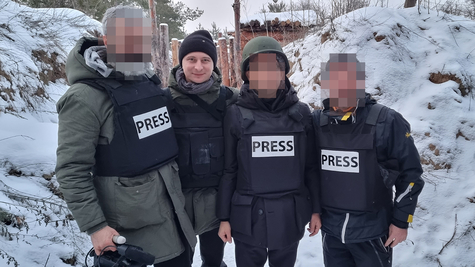
Image: A scene captured on February 17, 2022, during filming with a Japanese TV crew
"Trust" at the Core of Japanese Business and the Powerful Meaning Behind the Name YUKARI
Campbell: Could you please tell us what is most important to you when it comes to your work.
Zhygalko: For me, it's all about treating staff as family. The work is important, but if the team isn't happy, the company won't thrive. That's why I focus on creating an environment where everyone feels supported, and I always tell my team members to reach out to me if they encounter any challenges. Our company motto is "Trust First." I'm committed to building a strong, family-like bond with my team and fostering the same level of trust with our business partners.
Campbell: "Trust" is such a powerful word, and it really feels like a core part of Japanese culture. By valuing trust, you're not only building strong relationships but also creating new opportunities, which must help increase your team's happiness too. What's the story behind the name YUKARI?
Zhygalko: The name YUKARI represents "connection" or "bond." I chose it for the company name because everything about it--the meaning, the kanji, and even the sound of it--just felt right. It perfectly aligns with my mission to be the bridge between Japan and Ukraine.
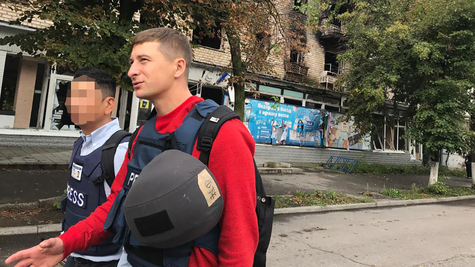
Image: Taken in September 2022 in Kharkiv--interpreting for a Japanese TV station
My Vision: Strengthening the Bond of Trust Between Ukraine and Japan
Campbell: I'm hopeful for the day when peace finally returns to Ukraine, and you can all travel freely once again. What's your vision for the future, Vitalii?
Zhygalko: My goal is to build a strong bond of trust between Ukraine and Japan through enhanced business and cultural exchanges. Looking ahead, I dream of even more collaboration between the two countries. In the meantime, I'm dedicated to providing high-quality services and deepening the trust that binds Japan and Ukraine.
Campbell: Finally, could you please share a message for the Japanese readers.
Zhygalko: To all the wonderful people of Japan, I want to express my heartfelt gratitude for your unwavering support of Ukraine. Even from so far away, your dedication and kindness remind us that we're not alone. Japanese culture and language are treasures I hold dear, and I encourage you to continue preserving Japan's beauty while sharing the incredible richness of your language and culture with the world. Thank you so much for this incredible opportunity--it means the world to me.
Campbell: Thank you so much, Vitalii. It's been amazing to feel the power of connecting the world and supporting others through the Japanese language. Thank you for your time today.
Profile
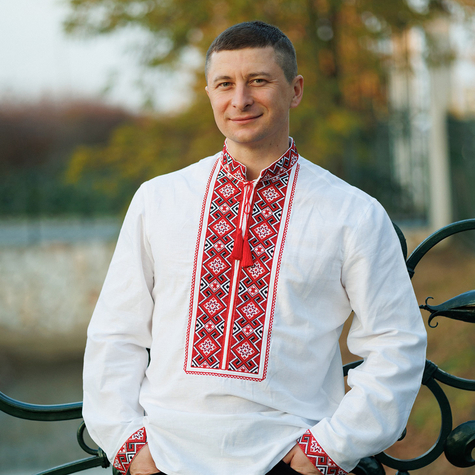
Vitalii Zhygalko, a Japanese interpreter based in Kyiv, https://yukari-ua.com/
is the cofounder and director of YUKARI, LLC. Originally from Makariv, Ukraine, he graduated from Kyiv National Linguistic University in 2010. After gaining valuable experience at the Kyiv branch of a Japanese trading company, he launched his career as an interpreter and coordinator for Japanese media outlets, including TV, newspapers, and radio in 2010. He served as an interpreter for the 2011 exhibition at the National Museum of the History of Ukraine and for the 2013 JICA project to reconstruct the Bortnychi Sewage Treatment Plant. In 2017, he launched YUKARI, LLC, and has since expanded his work to include high-quality interpretation services for Japanese media, businesses, and public organizations and the coordination of media coverage in Ukraine.
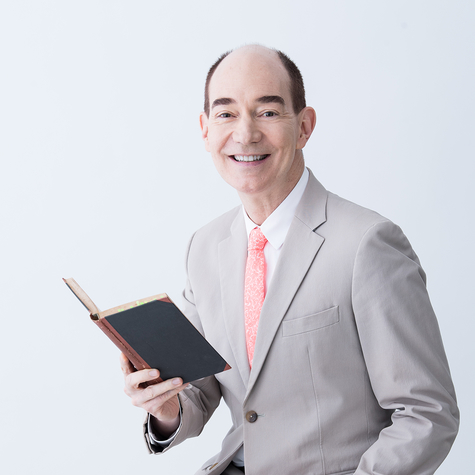
Robert Campbell https://robertcampbell.jp/
is a renowned scholar of Japanese literature, a specially appointed professor at Waseda University, Director of Sendai Mediatheque and an advisor to the Waseda International House of Literature (The Haruki Murakami Library). He is also a professor emeritus of the University of Tokyo and former director-general of the National Institute of Japanese Literature. Born in New York City, Campbell graduated from UC Berkeley and earned his PhD from Harvard University, the Department of East Asian Languages and Civilizations. After arriving in Japan in 1985 as a research student at Kyushu University, he became a lecturer there and later an associate professor at the National Institute of Japanese Literature. In 2000, he joined the University of Tokyo as an associate professor, becoming a full professor in 2007. He was appointed director of the National Institute of Japanese Literature in 2017, a position he still holds. Outside of academia, Campbell is a well-known figure in the media, regularly appearing as a TV MC, news commentator, and contributor to newspapers, magazines, book reviews, and radio programs. His research focuses on early modern and modern Japanese literature, particularly 19th-century classical literature (from the late Edo to early Meiji period), and its influence on literary genres, the arts, media, and philosophy. He is credited with many influential publications, including the recent book Senso Goishu (The dictionary of war) (Iwanami Shoten), which he translated from English into Japanese.
Keywords
Back Issues
- 2025.3.26 Ukrainian-Japanese I…
- 2024.11. 1 Placed together, we …
- 2024.5.24 The 50th Japan Found…
- 2024.5.24 The 50th Japan Found…
- 2024.5. 2 People-to-People Exc…
- 2024.2.19 Movie Theaters aroun…
- 2024.2.19 Movie Theaters aroun…
- 2023.4.24 The 49th Japan Found…
- 2022.10.24 Inner Diversity <2> …
- 2022.10. 5 Living Together with…

